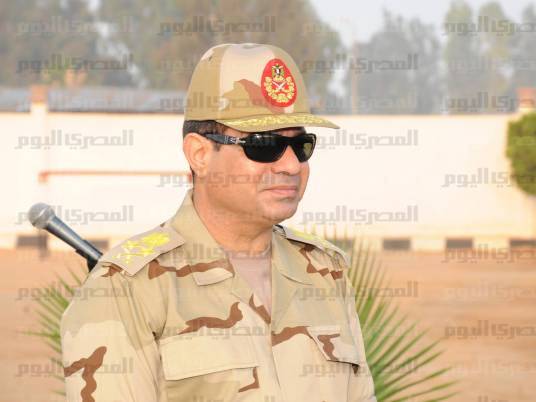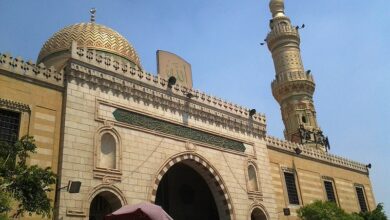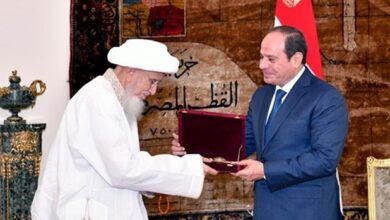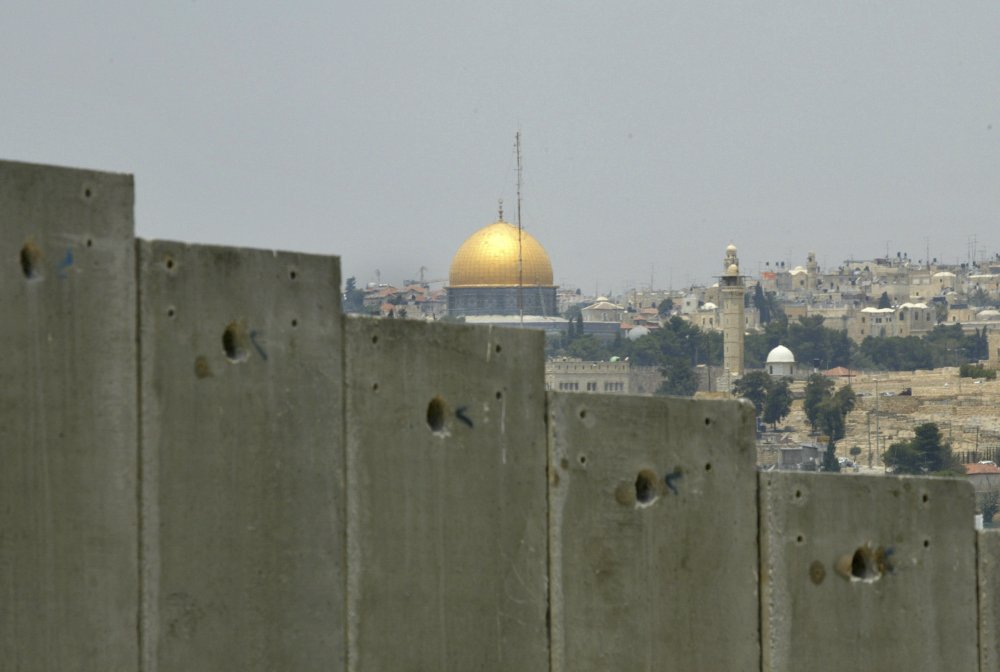
During a four-hour interview, Sisi did not refrain from answering any question but chose to hold back some details because, according to him, it was not yet the time to elaborate on them.
While Sisi believes that the decision to oust former President Mohamed Morsy prevented a civil war in Egypt, he speaks of Morsy respectfully. He says that the Muslim Brotherhood were not equipped enough to lead a country as big as Egypt.
When you were the head of military intelligence, you presented an assessment of the situation in Egypt in April 2010 in which you projected there would be a popular uprising with the people taking to the streets in the spring of 2011 and more specifically in May. How did you reach this conclusion?
The Armed Forces is a scientific institution, and the army has to base its actions and plans on science and developments in it. We have polling mechanisms within the army that monitor a lot of what happen within the army and some of what happens outside it as part of the Armed Forces’ national role.
All evaluations of the situation seemed to point out that a major event was on the horizon. I want to tell you that not everything about the first transitional period is being said, not now or in the coming years.
What concerns us, of course, is that the Armed Forces base its estimations on visions that have a strategic and scientific depth. There is a lot that cannot be said at this point in time. I reiterate that the period from 25 January up to now has taken a lot of our time, thought for the future, and search for solutions.
Our great military institutions have what it takes to detect issues, address givens and make projections. I tell everyone to stop talking about the past– let us talk about the future and follow up on the implementation of solutions.
Let us move to the rule of former President Mohamed Morsy. I remember asking you after Morsy won the presidency if he was going to be able to break free of the Brotherhood’s control over him and become a president for all Egyptians. You said it was not about whether he was able to do that, but rather about whether he was willing to do that in the first place.
So you predicted that he was not going to let the interests of the country take priority over the interests of the Brotherhood. How did you arrive at that conviction?
Let me be frank with you. I did not want my expectations to come true. I wanted to see a new rule that would protect the country from surrounding threats, provide an atmosphere of security and stability and achieve development that satisfies the ambitions of the people. My conviction that the president was not going to let the interests of the country take priority over the interests of the group was based on an in-depth study of several factors, including the general features of the president's personality and his relationship with the group [the Muslim Brotherhood] and its genuine goals.
The problem here– and I do not mean to offend anybody– emanates from the intellectual and ideological structure of the Brotherhood. This does not belittle them but it affects their efforts in managing a state. There is a big difference between the intellectual and ideological system of any group and that of a state. Both have to be in harmony. Problems occur when they clash. In order for the two to be harmonious, one of the two has to rise to the level of the other–so either the state rises to the level of the group, which is impossible, or the group rises to the level of the state by giving up its ideological, religious system, which I think is something they will not be able to do because it goes against the intellectual structure of their group. The discrepancy between the two systems will continue to generate differences and, sensing it, the people will take to the streets in protest.
Just like a group has an intellectual and ideological system, individuals also do. However, the intellectual system an individual has may be harmonious with that of the state because an individual may choose to rise to the level of the state. This is more difficult in the case of a group because a group has one ideology and it believes that giving up one individual is akin to giving up its ideology.
The answer to the question on whether the former president wanted to be a president for all Egyptians or not was not based on an opinion but a good reading of the situation because I knew what the reality of the situation was. When the Brotherhood reached power, the question was not whether Morsy was going to be a president for all Egyptians, but rather if he wanted to be a president for all Egyptians. I am not saying this to criticize anyone. In fact, this problem will face any current [leader] that is not aware of this issue. Islam for an individual is different from Islam for a group or for a state. There are things that an individual might accept while keeping his beliefs, but in the case of groups, we have a number of people who share some thoughts, which they are free to believe in. However, a group cannot force the people to have the same thoughts. This is particularly the problem with Islam for a group. Islam for a state, meanwhile, is more flexible and wider in scope, with room for diligence.
Can anybody question the Islamists' keenness on Islam? No, but the problem is they cannot distinguish between the practices of an individual of them as a human being, his practices as a member of a group, and his practices as part of a state. It is the lack of harmony between the systems governing the individual, the group and the state that has led to the current situation. They have made people see Islam as destruction. I want to tell you that those so-called Islamists have done harm to the image of Islam. Those who seem to be keen on religion have harmed Islam like never before. Islam is now synonymous to killing, blood and destruction. We have to assess the situation in an objective way and see how the world and other countries see Islam. The problem is definitely with implementation, not with the approach. It is implementation that has done harm to Islam.
Concerning your question on the former president, I say there was ample evidence. The information we had confirmed what I just said. I told them more than once that I was keen on their success and said the same to the entire religious current.
You became Defense Minister on August 12, 2012. Those close to the military establishment expected you to succeed Marshal Hussein Tantawi after his retirement. I know you met Tantawi when the decision was made, so what did you say to him and how did he answer?
First there are principles that should govern us in everything. I often say that the Armed Forces is a national institution that is characterized by honesty. Sometimes the situation may be baffling and you wonder what is going on. Is there a conspiracy, treason or collusion? Is there sincerity or not? I always emphasize that the military institution is an honest, patriotic institution that does not conspire or cheat. These are very noble human values, and institutions that do not have them should review their principles well. Those who believe in such principles do not give them up whatever happens and whatever the temptations.
Regarding my meeting with Tantawi, after swearing the oath, I went to the defense minister's office and shook hands with him.
What did you say to him?
I told him, "Sir, if you want me to leave, I will immediately!" and he replied, "No. You know what you mean to me and how much I value you."
I want to say that we have to know that the military institution is characterized by honesty and integrity. It does not know conspiracies or coups against leadership. Those are ethics we have deep inside.
Last year during the celebrations of the 6th October War victory, it came as a surprise to everyone that while the heroes of the war were absent, the killers of former President Anwar Sadat featured prominently in the celebrations.
Some say that this event marked the beginning of tensions between the military institution and the former president. Was it seen as a sign that Morsy could not be the commander in chief of the Armed Forces?
I do not agree with the idea that the former president was rejected by the Armed Forces and that this rejection grew more pronounced with time until we changed the regime forcibly. This was not true.
What happened resulted from a lack of background in state affairs and on how to lead a state, especially a state as big and with the same conditions as Egypt. If they [the Brotherhood] had been aware that what they did was going to send negative signals to society and the army, they would not have done it.
I am speaking very fairly. I do not want to exaggerate or claim things that are not true.
I believe that they did not understand the concept of a state or how to celebrate an occasion as such. That explains how the [6th October War] celebration ended up the way it was.
What happened reflected poor organization and poor judgment. He [Morsy] wanted to see looks of admiration and satisfaction in the eyes of the audience, and so he brought those who could create that sensation.
Looking at the history of the Brotherhood, you must realize the deep disagreement between the group and the Armed Forces reaching back to the historical disagreement between the Brotherhood and the leaders of the July 1952 revolution, particularly former leader Nasser. You should also realize the ideological differences between the two groups. While the Armed Forces is loyal to the nation and its borders, the Brotherhood is loyal to itself and the ideas of the caliphate which transcends borders.
The Brotherhood and their supporters do not realize the significance of the national flag and anthem, as well as national days like the celebration of the glorious 6th October War. The Brotherhood does not understand the need to remind the generations of the war’s significance and to honor its heroes and their families.
The result was that the celebration excluded the heroes and featured the killers who belong to the Brotherhood or have ties with it. This was shocking to us at the Armed Forces. Still, as a disciplined institution, we did not show disappointment or reject such irresponsible acts which did more harm to the state, the people and the Arab world, a partner in the victory, than to the Armed Forces.
Regarding the Brotherhood leadership and their websites’ insults against the Armed Forces, the Armed Forces has dealt with them in the same disciplined way. The Supreme Council of the Armed Forces held a meeting with the Brotherhood and presented a comprehensive report on the former president in order to communicate the Armed Forces’ disappointment regarding his [Morsy’s] actions. His acts were not in line with the Brotherhood’s desire to achieve rapprochement with state institutions and revealed a desire to clash with everyone–the police, the judiciary, the media, intellectuals, the Armed forces and the opposition.
On 11 December, you called for a community dialogue to find a way out of the political crisis. This came after Morsy issued a constitutional declaration that sparked great fury and then an amended declaration which did not appease the masses. This meeting was called off hours before it was going to be held. What happened?
We all agree that the constitutional declaration and the amended declaration uncovered the Brotherhood's scheme to hegemonize, and they sparked crises between the former president, his group and supporters on one hand and state institutions and the opposition on the other.
Against this backdrop, the Armed Forces made the invitation for dialogue out of a desire to create an atmosphere which would restore dialogue and trust between parties rather than a desire to participate in the political process. The idea was well received by all parties, including the presidency.
We were keen on their [the dialogues’] success because that would have been a success for the Egyptian state, but we thought that the state of instability could continue in light of the existing economic conditions and challenges. So we said that those who want the country to stabilize and grow should help the regime that was elected by the people succeed.
You cannot restructure state institutions all at once; reform has to take its time.
When political disagreements grew between the presidency, the state and political powers, I felt that we, the Armed Forces, would get implicated in this problem and that the state would pay the price for it. I did not want the Armed Forces to get implicated or the state to lose.
So I called Morsy and the head of his office answered. I asked him to tell the president about the Armed Forces' invitation to dialogue. He welcomed the idea and I told him to tell the president and to have him phone me.
Morsy phoned me and welcomed the idea. I asked if we should get started and he gave the green light.
We extended invitations to different parties, but then I learned that some people had called up the president and pushed him to cancel the invitation in order to prevent an opportunity for rapprochement between the group and national powers, a trend which continued until 30 June. Those were the same people who called for the continuation of the Rabaa al-Adaweya sit-in after 3 July. They lack proper political and security judgment and their advice is the cause of what we have now.
Are those people from inside Egypt or outside?
They are Egyptians.
Do they belong to the Brotherhood?
This is not the issue. I just want to say that their advice was to prevent the dialogue session by the Armed Forces from being held. The Armed Forces, as a patriotic, disciplined institution which only wants to give advice and does not covet power, submitted to the president's demand to cancel the invitation out of respect for the president’s status and a desire not to further complicate the crisis.
You once told the former president, "You have failed and your project has ended." When did that happen and how?
That was in February. We used to meet and talk a lot. Even though the discussion of political affairs between a president and the Armed Forces is a reserved affair, I felt ethically and nationally responsible to speak very frankly, even if it led to me relinquish my position, for in all cases, I would only leave my position at the time specified by God.
I remember telling him, "Your project has ended and the repulsion you have created among Egyptians is unparalleled by any former regimes. You achieved that in [just] 8 months."
On 12 April, Morsy attended his last meeting with the SCAF. The situation was tense because there were rumors that the defense minister was going to be removed. Other controversial issues related to national security, such as the Suez Canal project and the Halayeb standoff, had also surfaced.
On that day we had to convey our assessment of the situation. We might bear talk that harms us [the Armed Forces] but we cannot bear to see our country in danger. In that meeting, we said that the nation was in danger and that major procedures had to be adopted in order to respond to the people's demands to resolve the crisis.
I remember that the meeting called for by the president came at a time when rumors were circulating and reports tackled the Suez Canal project and its drawbacks, Morsy’s stance on Halayeb after visiting Sudan, and how the Freedom and Justice Party posted a map of Egypt on its website without the Halayeb triangle.
The purpose of the meeting was to speak frankly and to transparently express the military institution’s concern.
The meeting brought about several results. It most importantly emphasized the relationship between the presidency and the military institution and the rejection of any talk that demeans the military institution. It also emphasized adherence to the Armed Forces’ vision of national projects, particularly the project to develop the Suez Canal in conformance with development plans and national security requirements. The meeting also denied rumors about Halayeb. The leaders of chief army branches were also promoted as the step had been put off for some time.
I want to say that what preoccupied us was the issue of the borders and the canal project. It concerned us more than anything that was being said about the removal of leadership. National security is at the top of our priorities.
Let us move on to the Dahshour meeting with intellectuals and media professionals on 11 May. Many were shocked when you said that renewed involvement of the army in politics would pull the country back 30 or 40 years, which some saw as a sign that the army was going to let the people down. Then at the end of the meeting you said "Do not be in a haste!" What message were you sending across?
Here I would like to point out the importance of not taking a statement out of its context. The statements in this meeting also emphasized the main tasks of the Armed Forces and the country's need to engage in dialogue and cooperation in order to overcome the crisis, complete the political process and to urge the people to resort to the ballot box to establish democracy as a better option than resorting to the Armed Forces. This would have risked dragging the country backwards or pushing it into experiences similar to other countries that we would not want to go through.
These statements came at a time when the political process had reached a stalemate and there were calls for the Armed Forces to intervene before the situation deteriorated further. Foreign powers were looking at scenarios for the Armed Forces to intervene.
The statements a message urging all internal parties, especially the regime, to cooperate and engage in dialogue to overcome the crisis which occurred because everyone [the regime] had ignored warnings on the dangers of threatening the foundations of the state and plunging into chaos. The statement also answered foreign powers’ attempts to interfere in internal issues and cast suspicions on the patriotic role of the Armed Forces.
I wanted to give the former president a chance to change his position to save face, and I called him after that meeting and said, "You now have an opportunity for a genuine initiative." I gave him a chance to launch a real initiative to resolve the crisis in order not to complicate matters further.
At the same time, I did not want the public opinion to be too harsh on the Armed Forces because I felt that the public were starting to hold the army fully responsible for what was happening and to regard it as responsible for making change happen. This was very dangerous. Why? Had I not addressed the misconception that the Armed Forces would solve all problems and end the crisis between the people and the presidency, it would have been a coup. I did not want to launch a coup, as launching coups is not the role of the Armed Forces. It [the army’s actions] is all in the interest of the Egyptian state. I wanted to tell the people that I was not going to launch a coup, but the people would have thought that we [the army] had let down their trust.
I did not want to let people down or to cause them to lose hope in the army. I thought that every party should bear its responsibility and emphasized that there would be grave dangers in the case of a coup and that change would be better brought about through the ballot box.
In that meeting, you wanted to get the idea of a coup out of the people's heads and to tell them that they had to consider another solution?
Yes, because it is very dangerous for the army to launch a coup.
In the second part of our interview, we will discuss the 30 June revolution and the army's intervention on 3 July to support the people's revolution, but I want to ask how you assessed the situation before you intervened.
The army's decision to intervene was dictated by national interest, national security necessities, and fears of a civil war breaking out within two months if the situation continued as it was. The Armed Forces was following up on the developments and we believed that if we reached civil war, then the army would not be able to stop it.
Edited translation from Al-Masry Al-Youm




